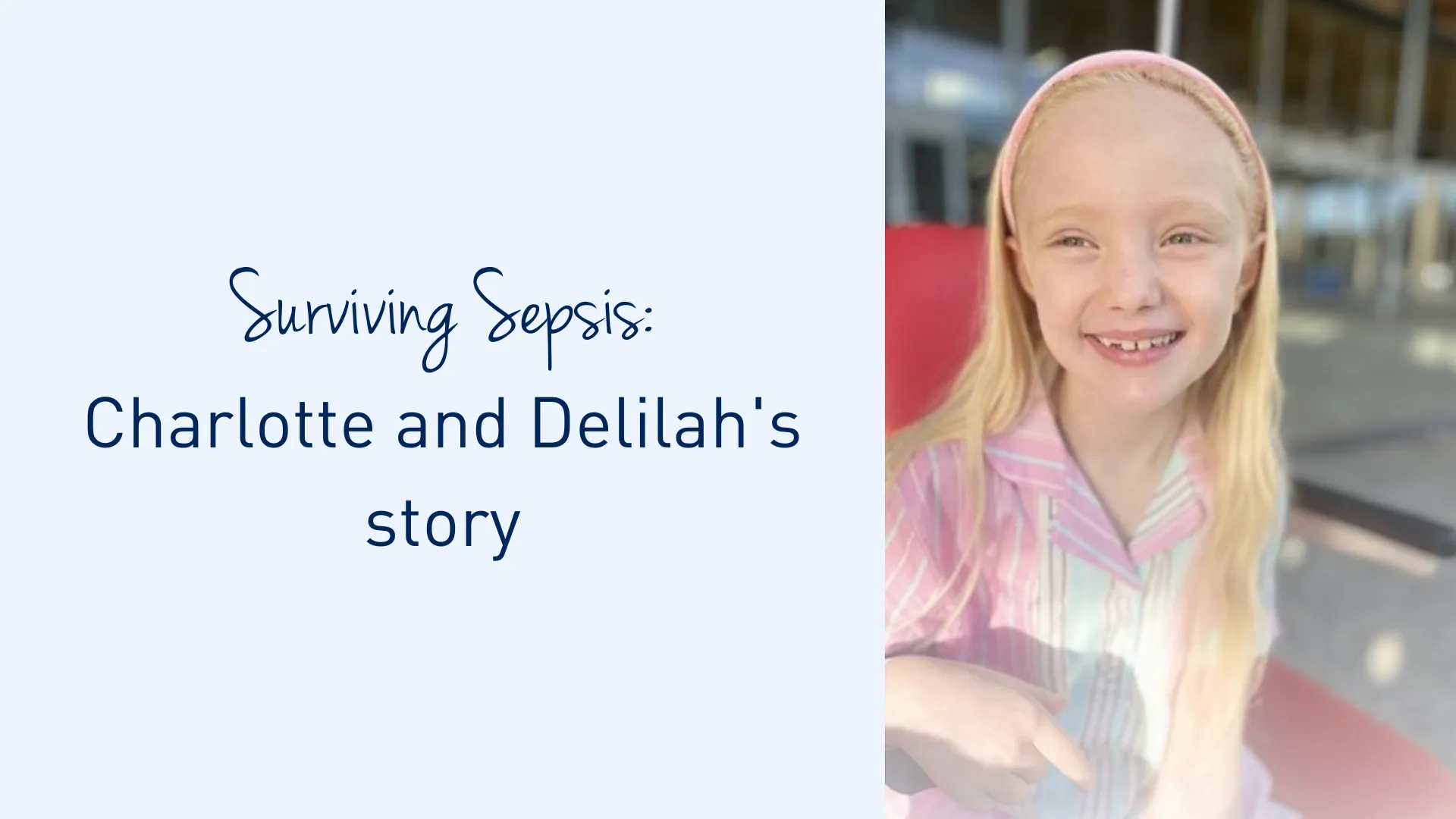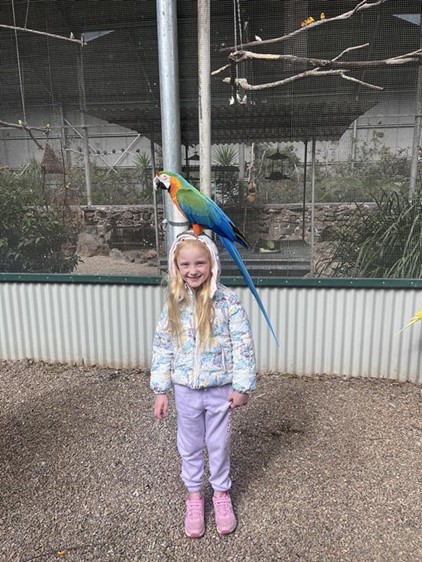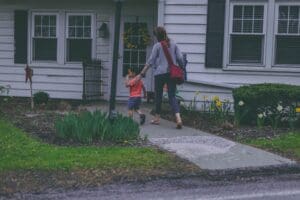
Parenting, anxiety, and knowing what to do
In a world of expectations, pressure and social media influence, this was a decision I felt confident in.

Every parent knows that bumps and bruises are as much a part of childhood as laughter and play. But for Delilah, an energetic 8-year-old with a passion for dance, martial arts, and new experiences, a simple fall off her skateboard began a journey far beyond the ordinary scrapes and soreness—into the world of Sepsis. Sepsis happens when your body is fighting an infection and starts to injure its own tissues and organs. The best chance of getting better from Sepsis is to treat it quickly.

It was March 2024, Delilah fell and injured her knee—not a scratch on the surface but enough to sprain and swell. What seemed like a typical injury took a turn within days. Delilah struggled to walk, developed a fever, and became lethargic, signalling that something was seriously wrong. “She couldn’t bear weight on her leg or straighten it, and she was in agony if anyone tried to touch or move her leg,” recalls her mother, Charlotte.
Initially, after an X-ray showed no fractures, the family felt a fleeting relief. However, Delilah’s persistent symptoms led them back to medical care. This time, a visit to their GP resulted in an immediate redirection to the hospital, armed with a new, ominous term from the doctor: “Sepsis.” The realisation struck Charlotte with a mix of guilt and fear. She had nearly dismissed her daughter’s worsening symptoms due to the initial clear X-ray and Delilah’s brief periods of happiness. The hospital stay that followed was a whirlwind of urgency and confusion as an orthopedic surgeon diagnosed Delilah with Septic arthritis in her knee.
The family found themselves thrust into a nearly three-week hospital stay involving two surgeries to flush out the infection, as well as differing antibiotics. A crucial turning point came via a Facebook message from a friend connected to the Queensland Paediatric Sepsis Family Support Program. This friend’s timely outreach led Charlotte to contact the program’s Social Worker, a decision that she describes as a lifeline. During this intense period, Charlotte opened up about her challenges, from handling her guilt and sleep deprivation to managing family dynamics under stress. “Every conversation was a lifeline, from venting about my frustrations to sharing the smaller, tender moments of hospital life,” she shares.
Delilah’s road to recovery was steep, marked by physical therapy and slow returns to normalcy, including going back to school on crutches. Charlotte watched with mixed emotions as Delilah did a cartwheel one sunny afternoon—a simple act that was nothing short of a miracle. Yet, Delilah’s return to skateboarding truly signified how far they had all come. “I stood there with the Mums and the skateboarding coach (who visited her in hospital!) and we were all like “wow this is an awesome moment”.,” says Charlotte. “I know this might not be the case for other children so I felt sad but I also felt huge relief for her because she was incredibly brave and it was a traumatic situation for her. She has the scars on her leg and she’s a bit self conscious about how the hair has grown back on her knee from where she had it shaved. We used to giggle about how it was spikey for a while like her Dad’s face when he shaves.”

“The impact immediately was just to survive” recalls Charlotte, balancing life, trips to the hospital, and daycare drop-off/pick-up for Delilah’s 2-year-old-brother. The ordeal reshaped their family life, emphasising safety in activities like skateboarding and bringing them closer together through shared experiences and discussions about their “bucket-filling and bucket-emptying memories.” Charlotte reflects on the dual nature of their journey—terrifying blood tests and surgeries balanced by wheelchair races, clown doctors, and community support.
Charlotte’s advice to other parents centres on vigilance and advocacy. Recognising symptoms like high temperatures, lack of mobility, and lethargy is crucial. She stresses the importance of acting quickly and seeking hospital care when these signs emerge. “There’s a fine line between being cautious and paranoid, but knowing what to watch for can save lives,” she advises. “The hospital was really busy on the night of Delilah’s xray and I felt that we were rushed. I wonder if Sepsis might have been identified earlier if it wasn’t so rushed. I provided this feedback to the hospital. I wish I knew more about sepsis because there were moments of frustration between the ortho team and the paed team with messaging that wasn’t consistent and sometimes I really felt that I had to advocate as her parent, to ensure I understood what the plan of action would be.”

Looking forward, Charlotte advocates for parental self-forgiveness and community support. “Taking notes, accepting help, and focusing on your own mental health are vital,” she emphasises. “Mum
life/Parent life is hard enough at the best of times. But throw in a complex medical issue and the
overwhelm is overwhelmed! Talk to people you trust, try to rest when you can, nap, drink plenty of water. Sometimes when you’re just surviving you do just reach for the sugar and fast food – don’t
stress about it. It will pass. A new normal will return. And if you have a long hospital stay with your
little person get into the sunshine as much as possible. Those sterile environments drag you down.
Real sunlight and fresh air can do wonders. When you’re home again make sure you have good
supports. Sometimes once everything is over and you’re not living off adrenaline, and having 100
conversations with nurses and Drs and Physios, it can become a bit lonely and post trauma can set
in. The same applies – nap, drink plenty of water, do what is easy (ie who cares if you have take away
3 days in a row) and get into the sunshine and fresh air.”
The family’s journey through sepsis has taught them the importance of resilience, reaching out to others for support, and the need to balance the urgency of medical crises with the nurturing of their own emotional well-being.
Delilah’s story is a testament to the resilience of the human spirit, the critical importance of medical awareness, and the powerful role of community support in navigating life’s most challenging moments. As they continue to share their story, Charlotte hopes to inspire and educate other families about the dangers of Sepsis and the profound impact of preparedness and informed action.

In a world of expectations, pressure and social media influence, this was a decision I felt confident in.
Sometimes an emergency presents in an unexpected way – which is why knowing what to do is so important.
